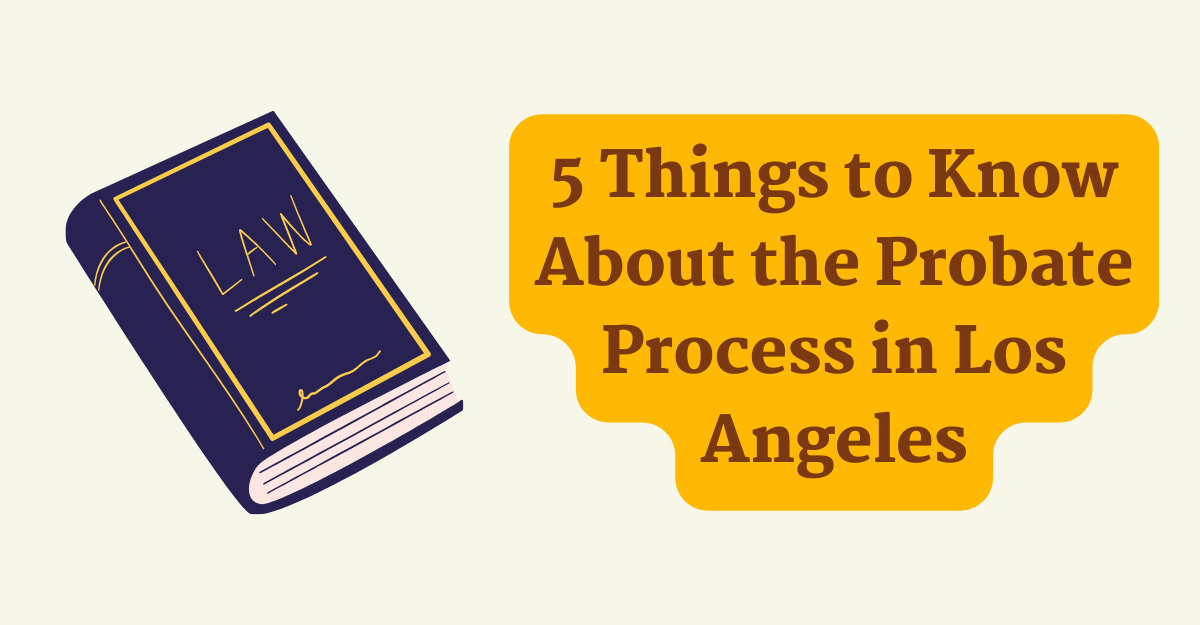
5 Things to Know About the Probate Process in Los Angeles
Navigating the probate process in Los Angeles can be a complex and nuanced endeavor, requiring a comprehensive understanding of the legal intricacies involved. This guide provides insight into five crucial aspects of the probate process in Los Angeles, shedding light on key considerations for individuals dealing with estate matters. From the role of the probate court to the timeline of proceedings, these insights aim to demystify the probate process, offering valuable information for those involved in settling the affairs of a deceased individual.
1. Probate Court’s Role:
The probate court in Los Angeles plays a central role in overseeing the distribution of a deceased person’s estate. Its primary function is to ensure that the decedent’s debts are settled, assets are distributed according to the will (if available), and the legal rights of all parties involved are protected. The court appoints an executor or administrator to manage the estate, and this individual becomes responsible for fulfilling the decedent’s wishes, addressing creditors’ claims, and distributing assets to beneficiaries. Probate court proceedings are initiated to provide a legal framework for the orderly settlement of the estate.
2. Probate Timeline and Delays:
Understanding the timeline of the probate process is crucial for all parties involved. In Los Angeles, the duration of probate proceedings can vary, but it typically takes several months to over a year to complete. Delays can occur due to various factors, such as contested wills, complex asset valuation, or disputes among beneficiaries. Creditors also have a specified period to file claims against the estate, contributing to potential delays. A thorough comprehension of the potential timeline allows beneficiaries and executors to manage expectations and plan accordingly during the probate process.
3. Executor’s Responsibilities:
The executor, appointed by the probate court, plays a pivotal role in executing the decedent’s wishes and managing the probate process. Responsibilities include identifying and evaluating the deceased person’s assets, settling outstanding debts, and distributing the remaining assets to beneficiaries. Executors must adhere to legal and administrative requirements, filing necessary documents with the probate court and ensuring that the estate’s affairs are handled transparently and ethically. In Los Angeles, executors can seek legal guidance to navigate the complexities of their responsibilities effectively.
4. Estate Taxes and Liabilities:
In the process of probate in Los Angeles, one of the most important aspects is figuring out how to handle estate taxes and responsibilities. The entire worth of the estate will determine whether or not it is liable to estate taxes at the state and federal levels. When it comes to determining and satisfying any tax liabilities that the estate can have, executors are required to collaborate with tax specialists. To avoid surprises and ensure that assets are distributed fairly, it is vital to carry out clear communication with beneficiaries on the possible tax effects. During the process of probate, it is also essential to address any outstanding debts and obligations to circumvent any obstacles and legal concerns in the future.
5. Probate Attorney:
Navigating the probate process in Los Angeles requires expertise, and enlisting the services of a probate attorney in Los Angeles can significantly ease the complexities involved. A probate attorney specializes in the legal intricacies of estate administration, ensuring a smooth and lawful transfer of assets. With a probate attorney, individuals can receive valuable guidance on adhering to local probate laws, managing estate debts, and resolving potential disputes. The role of a probate attorney extends beyond legal formalities; they serve as trusted advisors, helping clients make informed decisions during a challenging time. Engaging a probate attorney is a strategic step towards a well-managed probate process, providing both legal expertise and peace of mind to those dealing with estate matters in the vibrant city.
Conclusion:
In conclusion, gaining a comprehensive understanding of the probate process in Los Angeles is essential for individuals dealing with the affairs of a deceased person. From the role of the probate court to the responsibilities of executors, awareness of the timeline, estate taxes, and available attorneys is crucial. By navigating these aspects with diligence and seeking legal guidance when necessary, individuals can navigate the probate process more effectively, ensuring a smoother settlement of the estate and the fulfillment of the decedent’s wishes.